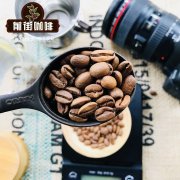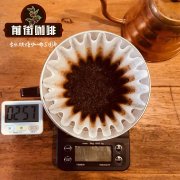Is it fake that the price of Blue Mountain coffee is less than 60 yuan per cup? Are you drinking "Blue Mountain" coffee?

Professional coffee knowledge exchange more coffee bean information please follow the coffee workshop (Wechat official account cafe_style)
The authentic blue mountains of Jamaica are planted at an altitude of more than 3000 feet in the blue mountain area, with high complexity and full aroma. Due to the scarcity of production and most acquisitions by Japan, the blue mountain coffee beans in circulation on the market are very rare and expensive!
Truth: there is no direct import of blue mountain coffee beans
The world-famous Blue Mountain Coffee, produced in the Blue Mountains of Jamaica, has been in short supply because of its low caffeine content (less than half of other coffees) and outstanding taste, catering to modern people's concept of healthy consumption.
Blue Mountain coffee beans are known as "golden beans". They are only produced in the Blue Mountains in western Jamaica, which are more than 1800 meters above sea level. Here, the mountains are steep, the air is fresh, there is no pollution, it rains all the year round, and there is a great temperature difference between day and night. Coupled with the unique new volcanic soil, the coffee beans produced here are slightly sour and mellow. The same coffee tree species taste very different whether they are planted in Hawaii, Kenya, Papua New Georgia or anywhere else with a similar climate.
The most important coffee bean trading organization in the world is the International Coffee Organization (ICO), which has 50 members of exporting countries and controls 99 per cent of global coffee production. According to industry insiders, coffee beans traded through the International Coffee Organization have strict quotas, as do Blue Mountain coffee beans. In the early years, there was basically no batch import of blue mountain coffee beans in our country.
According to the official English website of the International Coffee Organization. It was found that in 2003, 85% of the output of Lanshan coffee beans was supplied to the Japanese market and 15% to Europe and the United States. Mr.Denisseudieu, a staff member of the market situation department at the headquarters of the International Coffee Organization in London, said that there are several kinds of blue mountain coffee beans according to their quality. the top blue mountain coffee beans generally do not enter the market, and most of them are booked by the royal family and tycoons, while the blue mountain coffee beans in circulation are "Blue Mountain" brand coffee beans guaranteed by the Jamaican government, with an annual output of about 40, 000 bags and 170 tons. Most of these beans flow into Japan. Enter the European and American markets in a small amount.
Secret: be careful that you drink "Blue Mountain" coffee
According to the survey, there are indeed many blue mountain coffee beans in circulation in the international market. Countries such as Japan, because of their quota advantage, often process coffee beans and sell them to other countries and regions in the form of finely ground coffee powder or 0% coffee beans. For example, enterprises in Singapore, Hong Kong and Taiwan buy blue mountain coffee beans from Japan every year. Since such transactions are unofficial, the number is hard to know.
Since there was no quota for direct import of blue mountain coffee beans in the past, where did the blue mountain coffee on the market come from? Could it change hands from Japan, Europe and the United States?
However, from a Japanese coffee bean trading network, the current price of COPPER Blue Mountain coffee beans (the quality belongs to the blue mountain coffee beans medium to upper grade) is 340 US dollars / pound, and it usually takes 7 grams of coffee powder to make a cup of coffee. Calculated at this price, then the cost of making a cup of blue mountain coffee alone costs 50 yuan, plus normal wear and tear, a variety of labor and machine costs, the cost of blue mountain coffee will not be less than 60 yuan.
Huang Li, an obsessive coffee enthusiast, said he drank COPPER Blue Mountain coffee ground on the spot at a boutique coffee shop in Causeway Bay, Hong Kong, for HK $50 a cup. Obviously, if a cup of Blue Mountain coffee costs 50 yuan, it's not even enough to pay for coffee beans.
What kind of coffee is 50 yuan per cup of Blue Mountain Coffee? According to Shen, the owner of a well-known coffee shop, there are three kinds of Blue Mountain Coffee on the market. One is Blue Mountain Coffee, which costs about 50 yuan, which does not contain a real Blue Mountain coffee bean. It is mainly made from cheap beans from Brazil and Guadeloupe. Another kind of Blue Mountain coffee, which costs about 60 to 80 yuan per cup in upscale coffee shops, is the top "Blue Mountain" coffee, which is mainly made of Cona coffee beans from Hawaii or Jamaican alpine beans mixed with other coffee powders. The third is the so-called "Jamaican mixed Blue Mountain" coffee, which is imported from Japan and is a mixture of 30% Blue Mountain Coffee and 70% of the best Jamaican Alpine Coffee. You can drink it in five-star hotels and high-end clubs, but the price is more than 100 yuan per cup because it contains real blue mountain beans.
Why is it named Blue Mountain Coffee even though it is not Blue Mountain Coffee? Almost all people in the industry know that "there is no pure Blue Mountain Coffee on the market". It is named after Blue Mountain Coffee, but because Blue Mountain Coffee is so famous that consumers want to drink it. Therefore, the cheap blue mountain coffee beans from Brazil and Guadeloupe, which are used to make "Blue Mountain Coffee", are also in short supply.
Important Notice :
前街咖啡 FrontStreet Coffee has moved to new addredd:
FrontStreet Coffee Address: 315,Donghua East Road,GuangZhou
Tel:020 38364473
- Prev

[Truth] Not the most expensive blue mountain coffee is authentic blue mountain coffee price ≠ authenticity and quality
Professional coffee knowledge exchange More coffee bean information Please pay attention to Coffee Workshop (Weixin Official Accounts cafe_style) The world-famous Blue Mountain Coffee, produced in the Blue Mountains of Jamaica, has been in short supply due to its low caffeine content (less than half of other coffees) and outstanding taste, catering to modern people's healthy consumption concept. blue
- Next

You must know Yega Xuefei, the most high-profile producing area of Ethiopian coffee brands.
Professional coffee knowledge exchange more coffee bean information please follow the coffee workshop (Wechat official account cafe_style) Ethiopia is an important boutique coffee producing area, but also currently the place where coffee is grown. If you mention Ethiopia, you must know Yegashafi. Today, let's take a look at the special feature of this producing area. Ethiopia is Arabica.
Related
- Detailed explanation of Jadeite planting Land in Panamanian Jadeite Manor introduction to the grading system of Jadeite competitive bidding, Red bid, Green bid and Rose Summer
- Story of Coffee planting in Brenka region of Costa Rica Stonehenge Manor anaerobic heavy honey treatment of flavor mouth
- What's on the barrel of Blue Mountain Coffee beans?
- Can American coffee also pull flowers? How to use hot American style to pull out a good-looking pattern?
- Can you make a cold extract with coffee beans? What is the right proportion for cold-extracted coffee formula?
- Indonesian PWN Gold Mandrine Coffee Origin Features Flavor How to Chong? Mandolin coffee is American.
- A brief introduction to the flavor characteristics of Brazilian yellow bourbon coffee beans
- What is the effect of different water quality on the flavor of cold-extracted coffee? What kind of water is best for brewing coffee?
- Why do you think of Rose Summer whenever you mention Panamanian coffee?
- Introduction to the characteristics of authentic blue mountain coffee bean producing areas? What is the CIB Coffee Authority in Jamaica?

